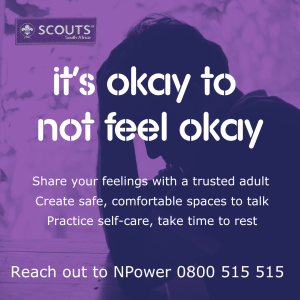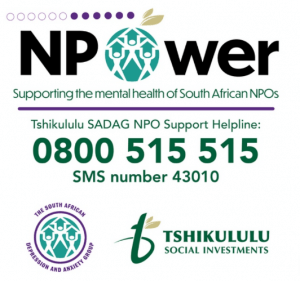
The past years have been hard on everyone, and our current society often doesn’t encourage hope. Therefore, SCOUTS South Africa chose to focus on Mental Health and Well-Being as our National Challenge. Today on #WorldMentalHealthDay we want to remind YOU, our members, that You are not alone! We are not individual Scouts trying to navigate our world, we are a Scout family and are here to support each other.
Reach out for help …
It’s normal for a child or teenager to feel sad, angry or moody. Setbacks such as getting cut from a sports team, doing poorly on a test, being grounded by a parent or having problems with a friend or classmate can bring on lots of emotions. If this is how you feel and you are not sure how to deal with your feelings and need help, talk to an adult you trust or you can pick up the phone and call NPOwer’s free helpline on 0800 515 515.
It’s also normal for adults to feel overwhelmed and desperate sometimes and just want to escape from a situation that seems impossible to deal with or to get out of. Other times we can get really angry or be very ashamed and just want to hide. But when the depressed mood stays for weeks or even months and affects their ability to function normally, it might be depression. If you are struggling, please reach out to an adult you trust. If you would rather talk to somebody over the phone., Remember that NPOwer is a free service offered to NPO’s and their volunteers. The free helpline is specifically there to help people in South Africa who are struggling with their mental health.
How can you help?
 Here are some basic guidelines on how to help when people reach out:
Here are some basic guidelines on how to help when people reach out:- Listen.
- Offer reassurance. Seeking help can feel lonely, and sometimes scary. Let them know that they did the right thing by reaching out to a friend to listen.
- Stay calm.
- Be patient.
- Try not to make assumptions or judge.
- Remember to check in regularly to see if they are okay.
- Encourage them to speak to their parents, family members, or call NPOwer for help.

